Iquitos in brief
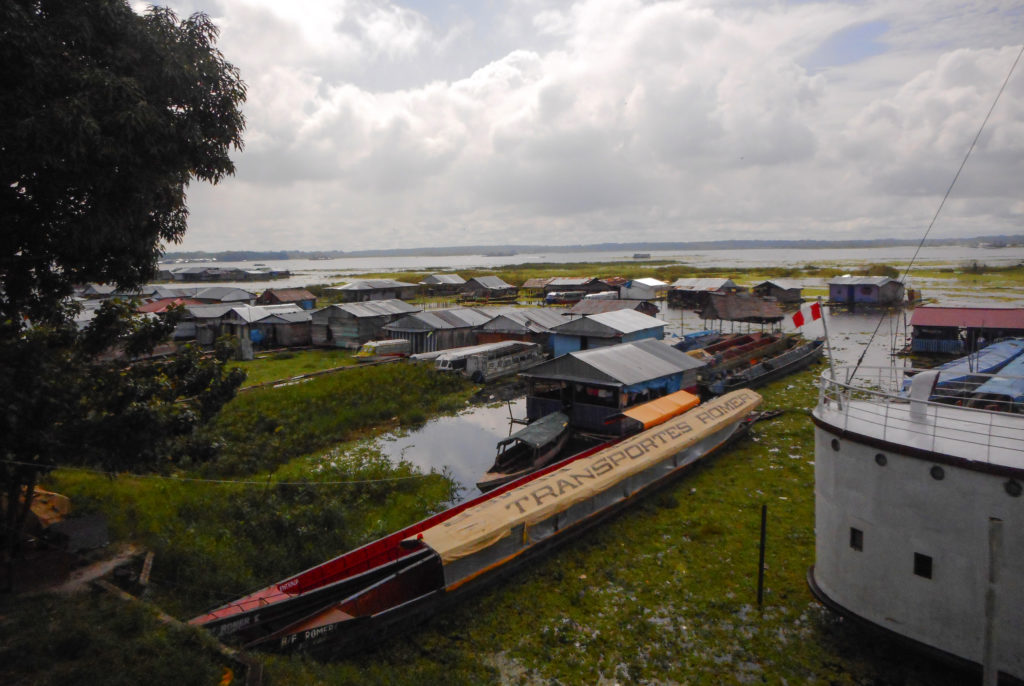
Iquitos is Peru’s largest Amazonian city and it is situated in the middle of the jungle, not far from where the Amazon River has its source. Moreover, the city sprawls along the banks of one of the main tributaries of this legendary river, which is one of the 10 most polluted waterways in the world. The only access to it from the rest of the country is by air or river, with several days of navigation required to reach the nearest city.
The level of poverty and unemployment are among the highest in Peru.
More than 400,000 inhabitants live here, 100,000 of whom reside in the district of Belen alone, which is known for its floating construction and its structures with pile foundations. Here the consumption of plastic, bottles in particular, is higher than the national average, the climate being the hottest in Peru.
The collection of waste is deficient due to the lack of infrastructure, the city’s very remote geographical location and the fact that certain districts, like Belen, sprawl directly along the banks and the river itself. The solid waste collected by the municipalities goes into landfill, which is not currently controlled, even though two rubbish tip projects are in the pipeline with the Ministry of the Environment. The fact remains that the vast majority of the waste is not collected and is instead thrown directly into the river by the inhabitants. The geographical remoteness makes it difficult to put in place a financially viable collection network for recycling plastic material. As a result, the price paid for recyclable plastic waste is very low, which does not encourage its collection.
Not linked to the national grid, energy production is done exclusively by oil-fired power stations with much higher production costs than the rest of the country.
R4W’s objectives
To reduce the quantity of plastics, which are dumped in the Amazon by converting it locally into electricity
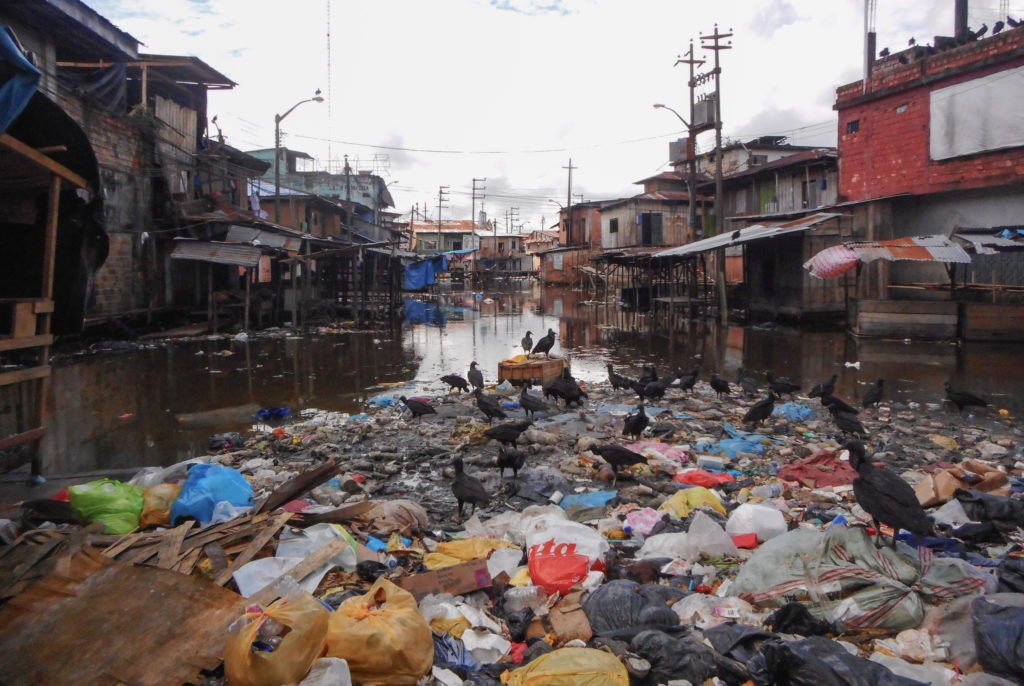
By installing a Biogreen® unit in the heart of the city, we hope to demonstrate the relevance of a regional plastic waste to energy model in places where the traditional management and waste recycling facilities are hard to implement.
In Iquitos, using plastic waste as a local resource for producing electricity would enable collectors to be paid at an attractive and stable market price, reducing the contamination of the rivers and the quantity of solid waste destined for landfill.
This project involves working with local organisations of street collectors, households, schools and businesses to coordinate the collection of plastic waste, whilst providing the necessary education to preserve the environment. In addition to providing a technical solution for processing the plastic waste, the implementation of this value chain for plastics will enable the creation of hundreds of jobs for the most disadvantaged communities.
Furthermore, the current oil-fuelled electricity production is extremely expensive. As such, Biogreen®’s high-temperature pyrolysis technology will replace part of this oil used for electricity production with a local resource that is both abundant and polluting, namely plastic waste. The revenue generated by the sale of this electricity will pay for the collection.
Local Collaborations
L+1
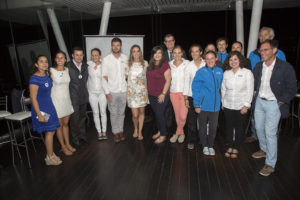
A genuine network of entrepreneurs, L+1 brings together the agents for change within Peru’s various economic sectors, all of them committed to the promotion of sustainable development. After a successful collaboration during our two-month stopover in Peru, which was packed with important meetings geared at rolling out projects across Peru, we decided to call upon L+1 to coordinate our activities on site. Their mastery of the terrain, combined with the diverse expertise of its members, are mighty assets for the success of the project in Iquitos.
Ciudad Saludable
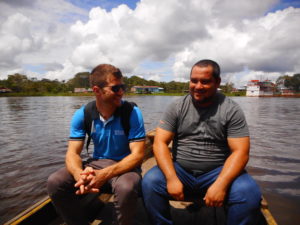
Created in 2002 by Albina Ruiz, Ciudad Saludable is the country’s most active NGO regarding the separation of recyclable waste and the formalisation of waste collectors. It is striving to realise a dream, that of building healthy, inclusive towns where harmony, justice and equal opportunities reign. To achieve this, it is offering a model of environmental citizenship and sustainable management based on the value chain of recycling. For over 15 years, its teams have been doing an outstanding job with the street collectors to give them access to social rights, support them in their work and provide them with social recognition, whilst also getting them involved in the environmental education of the population.
Given the complementary nature of our actions, we’ve decided to work together within the context of the “Act for the Amazon” project. In this way, Carlos Enrique Aguilar, coordinator of Ciudad Saludable in Iquitos, will support us in the implementation of a solid channel of collection by working with the street collectors, the municipalities, the schools and the local businesses.
Ministry of the environnement
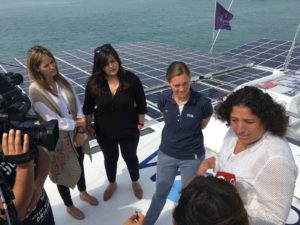
During her visit aboard our ambassador vessel, the Minister herself, Fabiola Muñoz, publicly announced that as far as the management of solid waste is concerned, the solution for Peru does not lie in the implementation of 200 rubbish tips right across the country. She went on to explain that what is required are innovative solutions, which enable the recovery and reuse of this waste. She also stressed the relevance of making the Amazon region a priority in terms of assistance, as much for its health and social status, as for the importance of its biodiversity.
Testimony: “The stopover of the Race for Water team on the coast of Lima has been an extraordinary opportunity to raise public awareness of the need to take care of the oceans and avoid plastic contamination. We have been able to appreciate that the technology exists to turn the problem of plastic into an opportunity to produce energy, generate employment and improve environmental quality. The visit of Race for Water in Peru had a happy coincidence when we discussed in the Congress of the Republic of the Law of Plastics for single use. This Law was finally approved on December 19, 2018. It is projected that plastic bags, straws, and disposable containers will disappear in cities; and that more recycling of plastic occurs every day. With this, it marks a milestone in the care of the environment and the reduction of pollution of water and aquatic life by plastic. Thanks to the Race for Water team for their visit to Peru! “
Marcos Alegre, Ex Vice Minister of the Environment